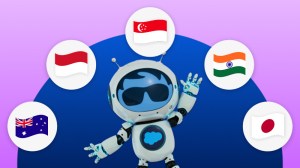The latest Salesforce Global AI Readiness Index has revealed what it takes to thrive in the era of agentic AI. For businesses and governments in Southeast Asia, this means shifting from simply using AI as a tool to building entire systems powered by it — automating complex workflows and accelerating outcomes across the organisation. The Index measures how countries globally are preparing to harness this power, to strengthen economic competitiveness, and drive the next wave of digital transformation.
So, what did the Index reveal? We’re focusing on three key areas for businesses in Southeast Asia: where Singapore and Indonesia stand today, what are the areas for improvement, and how to seize opportunities to accelerate adoption of AI agents.
What is the Salesforce Global AI Readiness Index?
Before we dive into the findings, if you haven’t seen our Global AI Readiness Index before, it’s an expansion and update of Salesforce’s Asia Pacific AI Readiness Index that accounts for the latest technological breakthroughs in agentic capabilities.
It provides a framework for understanding how prepared countries are to seize this opportunity, and points the way toward steps they can take to do so more effectively. The purpose of this Index isn’t to rank a country’s performance, or emphasise gaps in a country’s approach to AI.
Rather, it examines the way AI maturity and training can encourage peer learning, targeted investment, and agile experimentation to ensure that the benefits of AI systems with agentic capabilities are made more accessible, scalable, and inclusive.
The Index evaluates AI readiness across 16 key global markets where Salesforce operates, spanning five critical dimensions of AI development:
- Dimension 1: Enabling AI Regulatory Framework
- Dimension 2: AI Diffusion and Adoption
- Dimension 3: AI Innovation
- Dimension 4: AI Investment
- Dimension 5: Human Capital, AI Talent, and Skills
AI readiness in ASEAN: Spotlight on Singapore and Indonesia
The Index shows that while each of the 16 global markets is at a different stage of its AI journey, all markets are making progress in key dimensions. This means there’s a clear roadmap to becoming AI-ready — and a major opportunity to learn from one another.
Singapore in particular, has retained its top position as the most AI-ready nation in Asia Pacific, with a score of 26.5. Globally, it ranks second in overall AI readiness, just behind the United States. Its strong position exemplifies how an aligned strategy, public-private collaboration, and digital investment can create fertile ground for agentic AI.
On the other hand, Indonesia’s score of 17.6 places it below the global average of 22.1, but they’ve made significant progress in the past few years and have also adopted a national AI strategy.
Here’s how Singapore and Indonesia stack up across all five dimensions, revealing where the biggest opportunities for growth lie:
| Dimension 1: Enabling AI Regulatory Framework | Dimension 2: AI Diffusion and Adoption | Dimension 3: AI Innovation | Dimension 4: AI Investment | Dimension 5: Human Capital, AI Talent, and Skills |
| Singapore: 9.8 Australia: 9.4 Japan: 9.1 Indonesia: 7.6 India: 7.3 | Singapore: 8.0 Australia: 6.4 Indonesia: 6.3 Japan: 5.4 India: 4.8 | India: 4.0 Australia: 1.5 Japan: 1.5 Singapore: 0.7 Indonesia: 0.2 | Singapore: 2.3 India: 1.0 Australia: 0.9 Japan: 0.7 Indonesia: 0.3 | Singapore: 5.8 Japan 5.0 Australia: 4.5 India: 4.2 Indonesia: 3.3 |
AI in Singapore: A regional leader in AI governance and adoption
Singapore’s impressive performance in AI readiness is no accident; it’s backed by a smart national strategy. The country’s AI regulations are strong, moving from simply having principles to putting them into practice through things like regulatory sandboxes and assurance frameworks. In fact, the Index ranks Singapore first globally in the ‘Enabling AI Regulatory Frameworks’ dimension with a score of 9.8, well above the global average of 8.6.
Singapore also ranked highly in the ‘AI Diffusion and Adoption’ dimension, scoring an 8.0 out of 10. Its Smart Nation vision and AI procurement guidelines are critical to adoption, helping to drive AI integration across transport, urban planning, and citizen services.
When it comes to human capital, Singapore is also a leading example, combining strong AI skills pipelines with policy‑backed national upskilling strategies. For example, the Infocomm Media Development Authority (IMDA) is working with SkillsFuture Singapore (SSG) to expand the training programme SkillsFuture for Digital Workplace 2.0, to incorporate AI content within the curriculum. This will provide opportunities for employees to gain hands-on experience in using AI tools, improving their productivity at work.
Singapore’s government is also making a strategic push to help small and medium-sized enterprises (SMEs) get on board with AI. They’ve launched the GenAI Navigator for SMEs, a tool that recommends the best AI solutions for a business’s specific needs. And we’re right there with them.
Salesforce has partnered with the Singapore government on the Digital Enterprise Blueprint, to help equip SMEs and their employees with essential expertise, resources, and technologies. To accelerate Singapore’s digital transformation, we’ve also committed to investing $1 billion USD in the country over the next five years, focused on empowering businesses to embrace cutting-edge AI and drive growth.
The Salesforce Global AI Readiness Index
Gain actionable insights from leading countries on how to unlock the potential of agentic AI for greater growth, impact, and efficiency.



AI in Indonesia: Building a foundation
Indonesia is in the earlier stages of its AI journey compared to global leaders, but it’s quickly building a foundation. While the country has a national AI strategy, it still needs to tackle foundational challenges like connectivity and workforce readiness. Their score of 7.6 in ‘Enabling AI Regulatory Frameworks’ shows it’s building a governance framework.
The biggest opportunity for the country lies in AI innovation and AI investment. A lack of funding and research networks has held back growth, with the country scoring just 0.2 and 0.3 in these areas. Increasing investment can strengthen innovation and talent, which will help advance AI readiness across the nation.
On the talent front, Indonesia’s human capital score of 3.1 is below the global average of 4.5. However, this is set to improve with the recent launch of the AI Centre of Excellence. This initiative aims to train one million Indonesians in AI and related fields by 2027.
Advancing AI in ASEAN: Key trends and recommendations
In summary, the Index reveals several key trends for any business or government seeking to unlock the benefits of agentic AI:
- The value of peer learning: Although countries globally are at different stages of AI readiness, they share similar challenges and opportunities, particularly in areas like regulatory alignment, investment, and workforce readiness. Countries like Singapore and Indonesia can benefit from sharing best practices to accelerate AI adoption and innovation, and learn from what’s working well in other countries.
- The critical role of human capital: Human capital is a decisive enabler of AI readiness, yet workforce readiness is one of the weakest dimensions across countries. To address this, governments should embed AI literacy into general education and create specialised programs to upskill civil servants and professionals. This ensures that those who will oversee and collaborate with AI agents in business or government are prepared for this new era of human-AI collaboration.
- The importance of democratising AI access for SMBs: SMBs are increasingly aware of AI’s potential, with 75% of SMBs globally investing in AI➚. However, adoption remains uneven, particularly for those with limited technical resources or budget flexibility. To help SMBs adopt AI tools and improve efficiency, governments should launch incentive schemes and develop sector-specific playbooks.
Paving the way for agentic AI in ASEAN
Driving adoption of agentic AI hinges not just on technology, but on building institutional and public confidence. Governments across Southeast Asia can play a part by taking practical and forward-looking actions such as:
- Strengthening innovation ecosystems through public-private partnerships
- Addressing the talent gap and preparing workers across sectors for new roles and responsibilities
- Unlocking investment, especially for SMBs who are eager to embrace AI for growth but often lack the necessary resources to do so
Ready to build your AI strategy? Download the Salesforce Global AI Readiness Index now to gain actionable insights from leading countries, and unlock the potential of agentic AI for greater growth, impact, and efficiency.
Become an Agentic Enterprise: A Step-By-Step Guide
Create your AI strategy and find the best use cases. Our playbook has lessons, examples and tips for building an agentic enterprise.






















